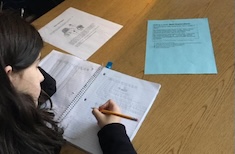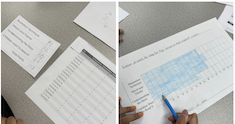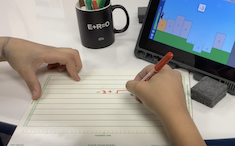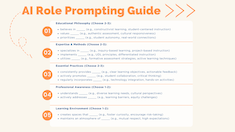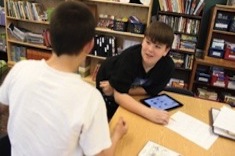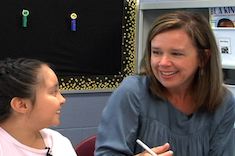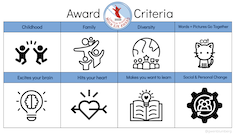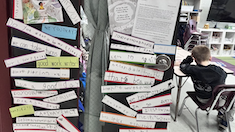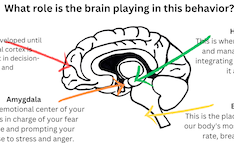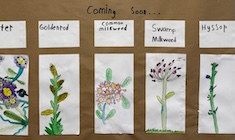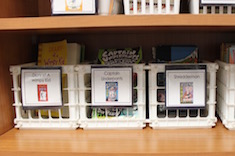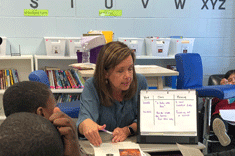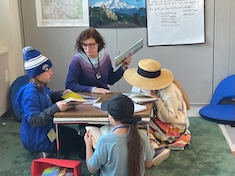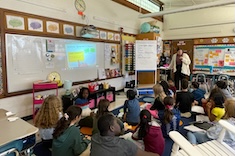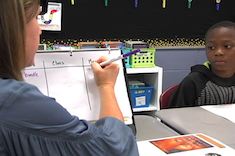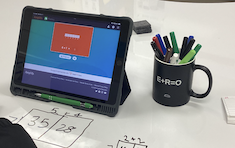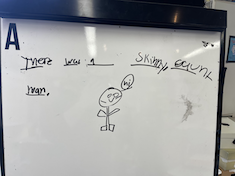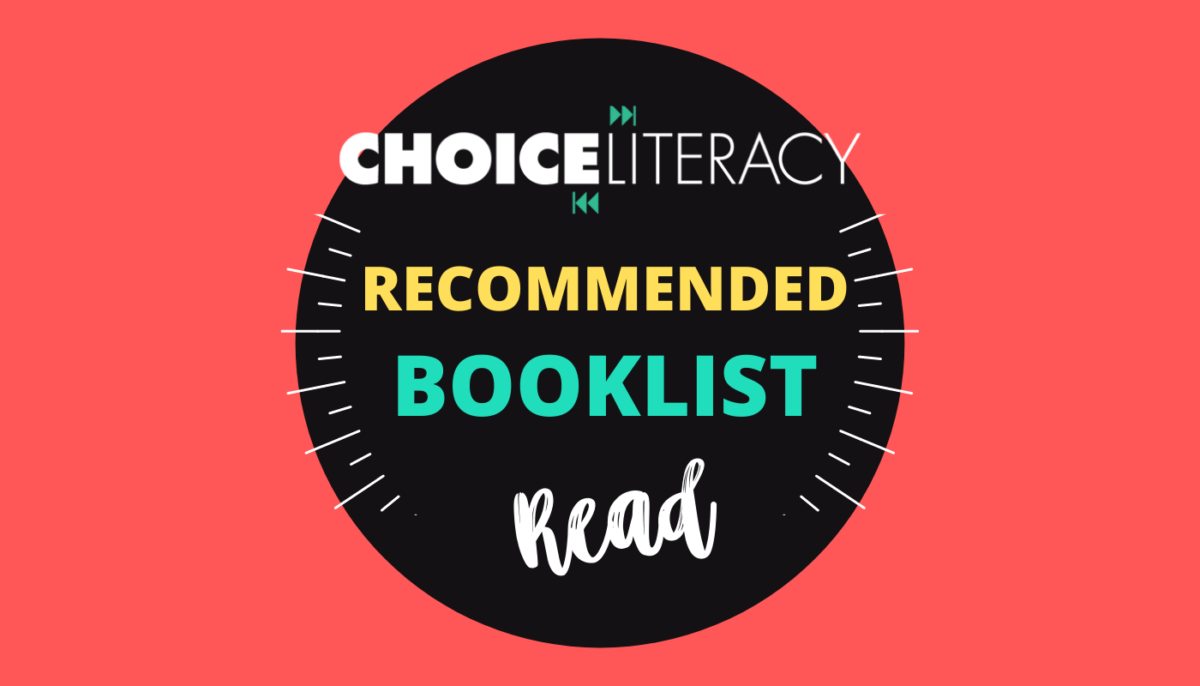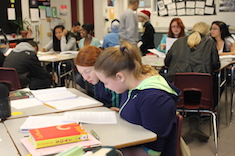Articles
Here is where you’ll find all the latest print features from our contributors. If you’d like to browse specifically by grade level, topic, or contributor, you can use the links in the right sidebar.
Latest Content
Books Are My Management Strategy
Becca Burk reflects on the power of reading as a way to set routines and help nourish healthy regulation.
Creating a Space
Gwen Blumberg clearly outlines different kinds of spaces for our classrooms and libraries. She was inspired by David Thornburg’s Learning Space model where he suggests creating campfires, watering holes, and caves to support different kinds of learning.
Setting Personal Goals for Math Independent Work
Mallory Messenger delivers a step-by-step guide to setting personal goals in math. Inspired by the practice of setting independent reading goals, Mallory explored the benefits of personal math goals. Download the Student Math Goals Self-Assessment and Reflection.
A Literacy Project Needed Math
Mandy Robek shares the way a Mock Caldecott project naturally connected to the math work happening in her third-grade class.
Developing Flexibility with Number Lines
Jodie Bailey offers clear and concise ways to use number lines as a tool to solve many different kinds of problems.
Beyond “I’m a Third-Grade Teacher”: The Power of Role-Specific Prompting in Educational AI
Brian Sepe helps us understand the importance of prompting and offers a framework that will help us be more intentional and specific to leverage AI for our needs.
Can AI Help with Assessment?
Tara Barnett and Kate Mills explore using AI to help with grading student writing. In this practical and insightful article, they share a process for using AI as a co-teacher and their reflection on whether it helped them save time (nope) and made their feedback more useful (yep). They share a downloadable student literary essay reflection sheet that you might want to use in your classroom, too.
All the Writing Things: Putting Writers in Charge of Their Writing
Inspired by coding time, Suzy Kaback works with her students to develop an All the Writer Things tool to help writers reflect on their work as writers and become stronger and more efficient.
Five Things I’ve Used AI for This Week
From lesson planning to generating decodable texts, Dana Murphy shares five ways she uses AI as a reading interventionist.
Not Your Granny’s Grammar: Create Intentional Transfer to Writing
Patty McGee offers strategies to intentionally help students transfer their grammar knowledge to authentic writing experiences in this final installment of the Not Your Granny’s Grammar series.
Not Your Granny’s Grammar: Grammar Manipulatives
Grammar manipulatives create a helpful scaffold to allow students a chance to play and practice, leading to a greater likelihood of transferring skills to their writing. Patty McGee shares a few ideas for grammar manipulatives.
And the Winner Is… Planning and Implementing a Mock Book Award
Gwen Blumberg shares a school-wide approach to a mock book award experience. This clear step-by-step guide with a rich resource download makes it possible to implement in any school.
Not Your Granny’s Grammar: So Long, Grammar of Yore
Patty McGee positions us to consider a fresh approach to grammar instruction in this first installment of a three-part series.
Letting Go and Trusting Students
Becca Burk turned to her students when her class needed an idea for a school-wide door-decorating contest. She was reminded of the importance of trusting students and uplifting their voices.
Say Cheese: Sharing Photos to Increase Family and Student Engagement
Most teachers have, at some point, taken a picture of their class or a particular student and shared that photo with a family, but what if teachers became more intentional about taking and sending pictures? Tiffany Abbott Fuller gives practical ideas for using photos to increase family engagement.
What Just Happened? Download a Behavior Sheet
Becca Burk shares her new learning about how the brain responds to trauma and the way she uses neuroscience to help respond to challenging behaviors in her classroom. Download a practical behavior sheet to help guide your responses to tricky behaviors.
Listening In Raises Student Voices
Mandy Robek knows how to nurture inquiry and collaboration in her classroom. She shares a process for supporting whole-class projects.
Community Circle
Bitsy Parks reminds us of the importance of taking time to talk, ask questions, and share thinking in a circle format. Community circle is a practice that strengthens an inclusive community.
The Influence of the Classroom Library
Heather Fisher writes a bold article addressing the many questions educators are facing about their values and beliefs when it comes to our classroom libraries in this time of a heavy emphasis on phonics instruction and decodable books.
Rhyme and Reflect: Fostering Fluency Through Poetry
Joanne Emery recommends using poetry to help children practice their oral expression. She offers many poetry books and strategies for fluency practice.
What Is ORF Anyway?
Dana Murphy reminds us that teaching students to read faster is often a surface-level answer to a much deeper question. Reading is a complex process; if you’re wondering what to do about oral reading fluency scores, then Dana offers powerful encouragement.
Helping Kids Lead Every Day: Differentiate with Precision
Tammy Mulligan shares three ways to precisely differentiate small-group instruction. This is the third installment of a three-part series.
One Size Does Not Fit All: Flexibility in Tool Creation
Sometimes, we ask students to conform to tools that we’ve already created or have found success with when working with former groups of students. However, one size does not fit all. Melissa Quimby shows us how we can be inspired by moments of productive struggle and consider how to help a tool fit our students rather than the other way around.
How to Intensify an Intervention
What happens when students’ reading data takes a downward trend? Dana Murphy encourages us to be confident and intensify a reading intervention with three practical moves.
Helping Kids Lead Every Day: How to Deepen Small-Group Discussions
Tammy Mulligan shares the step-by-step process she uses with her fourth-grade students so that their small groups are fully managed by students and her teaching is focused on their needs as readers. This is the second installment of a three-part series.
Vertical Conversations to Create Coherence
Jodie Bailey shows how representations and models help students understand complex math concepts. By participating in vertical conversations, teachers can strengthen our own understandings of skill progressions and help students develop essential connections and deeper understandings.
Building Thinking Classrooms in Literacy
Inspired by Peter Liljedahl’s Building Thinking Classrooms in Mathematics, David Pittman applies instructional practices to get students thinking for themselves as readers and writers, and to be drivers, not consumers or mimickers of someone else’s way of doing things.
Got Criteria? How to Help Students Engage with Success Criteria
Heather Fisher offers four tips for engaging our youngest students with daily criteria for success.
Booklist: Books that Cultivate Kindness
It’s easy for students to forget to show kindness, especially in the gray days of winter. Joanne Emery shares a powerful picture book called Two Sandals, Four Feet by Karen Lynn Williams and Khadra Mohammed and illustrated by Doug Chayka. She includes a list of additional titles to inspire kindness in your classroom all year long. If you love discovering new books, you’ll appreciate this list!
Giving Kids Time and Space to Show Their Brilliance
Mallory Messenger suggests three instructional moves to provide time and space for students to show their brilliance. This is a must-read for anyone who wants to position students to learn.
Browse Content By
Type
Category
- Assessment Tools
- Big Fresh Archives
- Booklists
- Choice Numeracy
- Classroom Design
- Common Core
- Community Building
- Conferring
- Content Literacy
- Digital Literacy
- English Language Learners
- Equity
- Family Relations
- Free Samples
- Guiding Groups
- Leadership
- Literacy Coaches
- Mentor Texts
- Minilessons
- New Teacher Mentors
- Podcasts
- Poetry
- Quote Collections
- Reading Strategies
- Self Care
- Struggling and Striving Learners
- Talking and Listening
- Teacher Study Groups
- Teaching Reading
- Teaching Writing
- Word Study and Vocabulary
Author
- Melissa Quimby
- Nawal Qarooni
- Gwen Blumberg
- Julie Cox
- The Lead Learners
- Hannah Tills
- Josie Stewart
- Ruth Metcalfe
- Mallory Messenger
- Becca Burk
- Jodie Bailey
- Vivian Chen
- Mary Brower
- Tiffany Abbott Fuller
- Stephanie Affinito
- Ruth Ayres
- Leigh Anne Eck
- Heather Fisher
- Shari Frost
- Julie Johnson
- Suzy Kaback
- Gigi McAllister
- Shirl McPhillips
- Melanie Meehan
- Cathy Mere
- Debbie Miller
- Tara Barnett and Kate Mills
- Tammy Mulligan
- Dana Murphy
- Bitsy Parks
- David Pittman
- Brenda Power
- Heather Rader
- Matt Renwick
- Mandy Robek
- Christy Rush-Levine
- Gretchen Schroeder
- Jen Schwanke
- Brian Sepe
- Katherine Sokolowski
- Stella Villalba
- Jennifer Vincent
Grade Level
Choice Literacy Membership
Articles
Get full access to all Choice Literacy article content
Videos
Get full access to all Choice Literacy video content
Courses
Access Choice Literacy course curriculum and training



